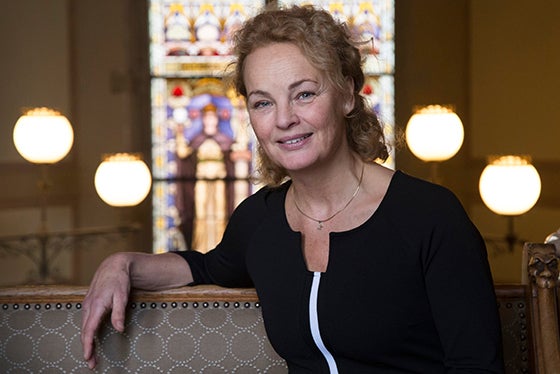UMC Utrecht has appointed training director of medicine Annet van Royen-Kerkhof as professor of Interdisciplinary Education in Medicine from 15 June 2023. The chair, which falls under the strategic theme Child Health, strengthens interdisciplinary cooperation between the UMC Utrecht and training courses, both at Utrecht University and beyond.
Annet van Royen works as a paediatric immunologist at the WKZ/UMCU. Her research focuses on new insights into rare autoimmune diseases in children. With juvenile dermatomyositis (JDM, muscular rheumatism) as a major area of focus. She focuses on improving the diagnosis and treatment of children with JDM. She was also involved in ‘The New Utrecht School’ together with Stefan van Geelen and Gaston Franssen. An innovative collaboration between disciplines in training healthcare professionals, which was established in 2017. Since May 2021, Annet has been training director of Medicine within UMC Utrecht/UU. She succeeds Tineke Westerveld with whom she worked closely. Tineke passed away unexpectedly in December 2020. Annet: “Tineke considered interprofessional training a mission and her thinking is valuable in current developments.”
The social issues facing the next generation of doctors are complex. The brand-new professor aims to prepare the next generation of professionals in the interdisciplinary field of health for the changes of the 21st century. Starting with a change in the curriculum of the Bachelor of Medicine, Master of Medicine. She is also ultimately responsible for SUMMA – a four-year master’s programme that trains you to become a doctor and clinical researcher – and a new one-year master’s programme in Medical Humanities. She was also involved in the design of the bachelor ‘Care, Health and Society’ which started in 2022. This involves the programmes in Veterinary Medicine, Medicine, and Pharmacy.
Given the complex societal challenges we face, future doctors need to be trained as creative problem solvers. Professionals who can think critically, who take responsibility for themselves and society, who have communication and technical skills. Actively involved in major societal challenges within the health domain. We train students who have a combination of scientific knowledge, compassionate insight, and future-proof skills. “Change is necessary to ensure that doctors can hold their own, but that they are also able to apply concepts, weigh up new knowledge and collaborate with professionals who think, look and speak differently. And to see opportunities rather than threats in the face of rapid (technological) change.”
The realisation that change is necessary to equip future students with adaptability, and the corresponding knowledge and skills, lived on among scholars at Utrecht University after World War II. This shared thinking was called The Utrecht School. This internationally recognised network in which different disciplines worked together was active until the mid-1960s. “In 2017, Stefan van Geelen, Gaston Franssen and I started a movement to embrace such thinking again. That has brought us here. Medicine students are now having different experiences, as they set up projects with students from, for example, a technical university,” says Annet. Within UMC Utrecht, the urgency of this was recognised by, for example, dean Arno Hoes and vice-dean Berent Prakken. The UU has also now appointed a dean and programme manager to develop a clear vision of interdisciplinary education, encourage interfaculty cooperation and set up a support and governance structure. Annet: “In cooperation with Utrecht University of Applied Sciences, HKU the seven UU faculties, WUR and Eindhoven University of Technology, we are heading for sustainable changes in higher education. That suits these times.”
